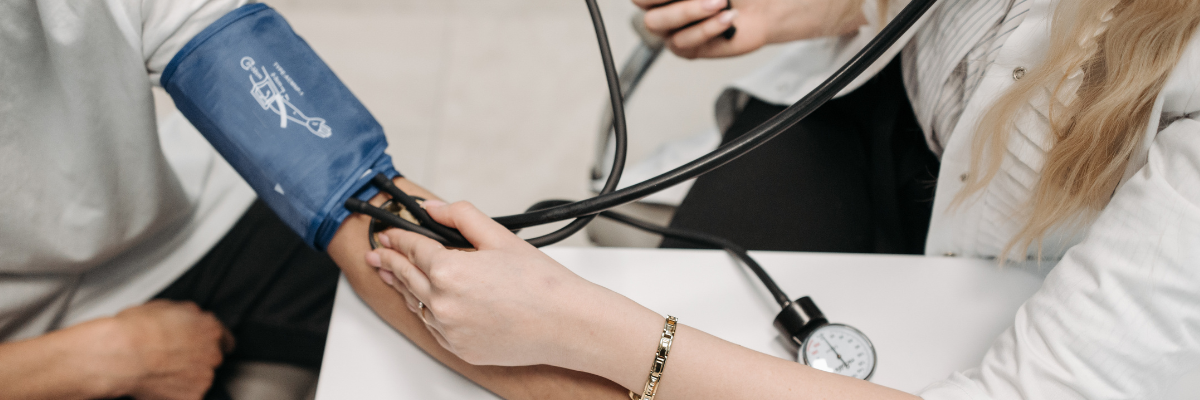Estimated reading time: 7 mins
Ever heard of the “silent killer”? High blood pressure (hypertension) is a common condition that is often symptomless. And the bad news is, it can be deadly. When left untreated, high blood pressure can lead to life-threatening problems such as a heart attack, heart failure and stroke.
What is hypertension?
High blood pressure, also known as hypertension, affects around a third of adults in the UK. Blood pressure is the term used to describe the strength with which your blood pushes on the sides of your arteries as it’s pumped around your body. Throughout the day, it’s natural for it to increase as you move around. However, if your blood pressure is consistently high even when resting, it’s time to do something about it.
Common symptoms of hypertension
Most people that suffer from high blood pressure experience no signs or symptoms. However, when symptoms do occur, they can include early morning headaches, nosebleeds and irregular heart rhythms. Severe hypertension can also cause fatigue, nausea and confusion.
The only way to know if you suffer from hypertension is by having a blood pressure test. It’s advised that all adults over 40 have a test at least every 5 years. It’s easy to have checked, and you can be tested at a number of places including your GP surgery or at some pharmacies. You can also check your blood pressure yourself using a home blood pressure monitor.
Is there a link between hypertension and OSA?
Studies have found that about one half of patients who have hypertension have obstructive sleep apnoea (OSA). When OSA sufferers sleep, their mean blood pressure often fails to decrease as it would normally during sleep. Instead, it remains at a similar level to the awake blood pressure. This is caused by frequent apnoeic (the complete blocking of your airway)/hypopnoeic (the partial blocking of your airway) episodes. With up to 600 per night, these end with arousals that cause spikes in blood pressure, lasting for several seconds.
What is OSA?
Obstructive sleep apnoea (OSA) is a sleep-related breathing disorder. It causes you to repeatedly stop and start breathing whilst you sleep. The most common indicator of OSA is loud snoring, and sufferers often make gasping/choking noises during the night. This is because snoring occurs when the airway narrows and air is dragged across the soft tissue in the throat For people with OSA, their airway becomes so narrow that the walls of the airway stick together and close. This usually happens for around 10-30 seconds at a time, but can occur for longer – sometimes up to 50 times an hour or even more.
When the airway finally opens again, you might produce a loud, violent snore. This is known as an apnoea. Throughout the night, your body will constantly come out of deep sleep in order to help you breathe – doctors call this an “arousal”. This is what causes you to feel sleepy the next day.
The symptoms of OSA
Symptoms of OSA can disrupt your everyday life, as well as your partner’s. However, it can also leave a greater emotional impact. Depression is highly common in people with untreated OSA. Many people are treated for depression for years before they realise that OSA is the cause.
You may experience some symptoms whilst awake, and as you sleep. Not everyone will experience all of them.
Symptoms during sleep:
- Breathing stopping and starting
- Making gasping or choking noises
- Waking up a lot
- Loud snoring
Symptoms whilst awake:
- Feel very tired
- Find it hard to concentrate
- Mood swings
- Have a headache when you wake up
You should always visit your doctor if you suspect you have OSA. They’ll be able to give you an official diagnosis and recommend the best treatment option for you.
How to treat OSA and manage hypertension
There are various treatment options available for OSA sufferers. If you suspect that OSA is linked to your high blood pressure, it’s a good idea to speak to your doctor first to see which treatment they recommend for you. This will not only improve your quality of sleep, but also help manage hypertension.
The most common treatment for severe sleep apnoea is a CPAP machine. This works by pumping air into your lungs at night to prevent the airways from collapsing. Studies have found that this treatment helps to lower blood pressure during the day and at night.
For mild-to-moderate sleep apnoea sufferers, start by making lifestyle changes like reducing alcohol and cigarette consumption. This will help with both treating OSA and lowering blood pressure.
The NHS recommends using an oral device which will hold your jaw forward and open your airway. The Snoreeze Oral Device is a great treatment option. Easily moulded at home, this boil-and-bite mouth guard is fully adjustable and offers a secure, comfortable fit.

